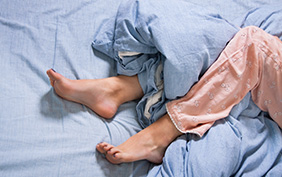RLS: A common sleep disorder, commonly misunderstood
October 24, 2018

Many suffer from sleep disorders such as sleep apnea, periodic limb movement, narcolepsy and insomnia. One common disorder, Restless Legs Syndrome (RLS), plagues both people who suffer from it and the sleep medicine professionals who study it.
Sleep Specialist Clifford Massie, Ph.D., FAASM weighs in on this perplexing disorder and answers common questions.
What is RLS?
By definition, it’s the irresistible urge to move your legs. That’s the hallmark, primary symptom. If you don’t have that, then you don’t have RLS. Sometimes people describe tingling or a creepy crawling feeling, but you don’t have to feel something in your legs to have RLS.
Should I have a sleep study done to diagnose RLS?
Sleep studies don’t tell us anything about RLS. It’s a misconception that a sleep study is needed to diagnose RLS. RLS happens when you’re awake and only when you’re awake. We diagnose it based on symptoms. However, patients with RLS may also have sleep apnea, and a sleep study is needed to diagnose sleep apnea.
What about when my legs jerk in my sleep? Is that RLS?
During sleep you can have periodic leg movements but that is different from RLS.
How do you diagnose RLS?
The simple way to tell is by asking this one question: “Do your legs bother you when you are trying to fall asleep at night?” Other questions to ask would be, “Do your legs bother you when you have been seated or have been lying down for a while, especially late in the day?” and “Do you get some relief if you get up and walk around?”
What can and can’t help a patient with RLS?
Sleeping pills typically don’t help. OTC sleep aids may actually make RLS worse. Caffeine, alcohol, and poor sleep habits can potentially make RLS worse.
How can I tell for certain if I have RLS?
Symptoms come on when you’re not moving. If you’re moving around, you probably won’t notice it. The symptoms worsen in the evening and at night. The longer you are not moving, the worse it gets. Your legs need to be moved in order to get relief.
Does RLS present the same with all patients?
While the diagnostic criteria is very specific, patients can present with a variety of symptoms. They may find it difficult to put into words what they are experiencing. I’ve seen hundreds of patients with RLS. It’s pretty common. Kids can have it, but it’s most common in older adults. It can start out mild, have a waxing and waning course. It can get worse over time, but then it can go away for a time. Even if it goes into remission, it might come back.
How is it treated?
We really don’t treat it unless it adversely affects a patient’s quality of life or it significantly interferes with sleep. When it’s significant enough to treat, we put people on prescription medication.
Are there other alternatives?
As long as you have good health and sleep habits, there are some studies that show that magnesium supplementation can help. See the FDA website for proper dosages based on your age group.
What are the medications used to treat RLS?
There is a lot of debate in the sleep community about medications for RLS. Requip and Mirapex are both FDA approved and each have generic equivalents to treat moderate to severe idiopathic RLS.
How does RLS get misdiagnosed?
People often wonder if it’s their veins or blood vessels. It’s not. Even though this happens in their legs, the cause of it is in your central nervous system and it’s related to iron and dopamine. It’s a problem with the neurotransmitters in your brain.
How does RLS affect sleep?
Because you feel the need to move your legs, it can cause severe insomnia and daytime fatigue and tiredness.
How many people suffer from RLS?
It’s really difficult to get a precise number. In North America, up to 10 percent of people have RLS. It’s pretty common.
Do we know what causes RLS?
There is a genetic influence, but there is no genetic test to see if you are at increased risk for developing it. For example, if both parents have it, there’s no way to know how likely you are to get it.
Clifford Massie is a Sleep Specialist with the NCH Sleep Disorders Center. Call 847-618-3190 to schedule an appointment.